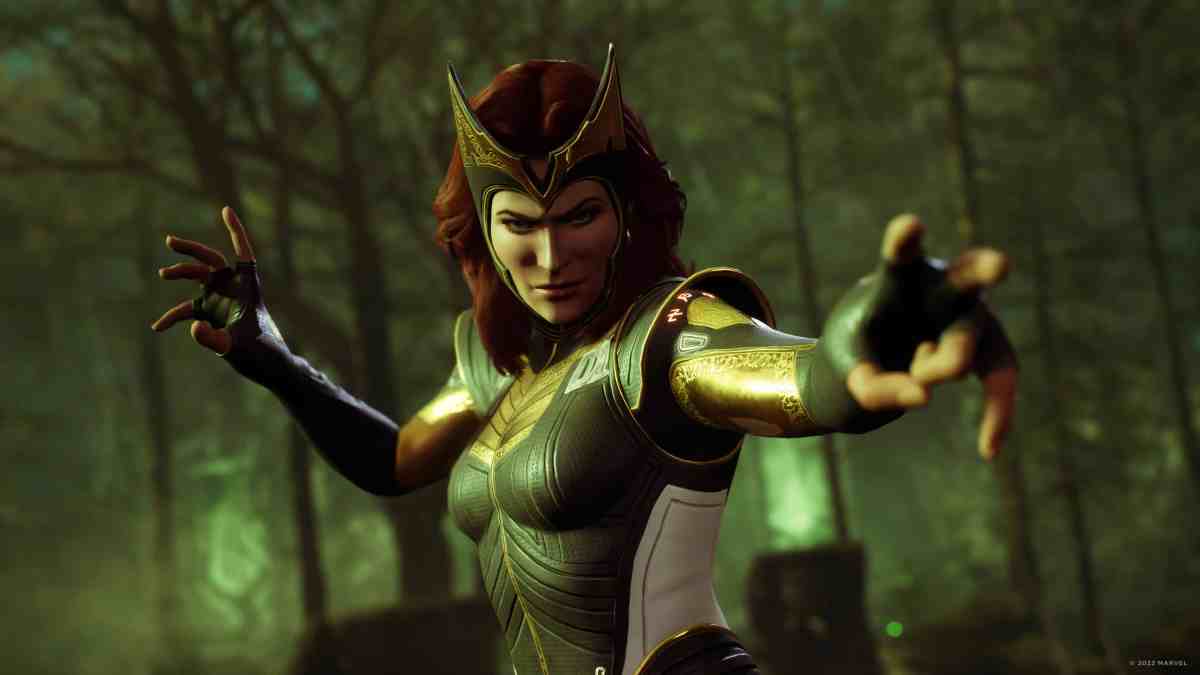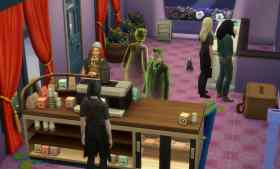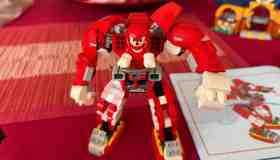Marvel’s Midnight Suns is not XCOM with Marvel characters. Creative Director Jake Solomon and Executive Producer Garth DeAngelis have spent the entire pre-release promotional period for the game essentially saying as much.
Given the Firaxis reboot of the iconic PC tactical strategy game (which Solomon and DeAngelis were both heavily involved in) essentially redefined and completely revitalised the whole genre in 2012 with XCOM: Enemy Unknown, it’s hard to believe they would step away from it all and risk deconstructing everything they had built for something completely new.
But that’s what had to happen when Marvel’s games team approached the studio with the chance to build a new original game using Marvel superhero characters and stories.
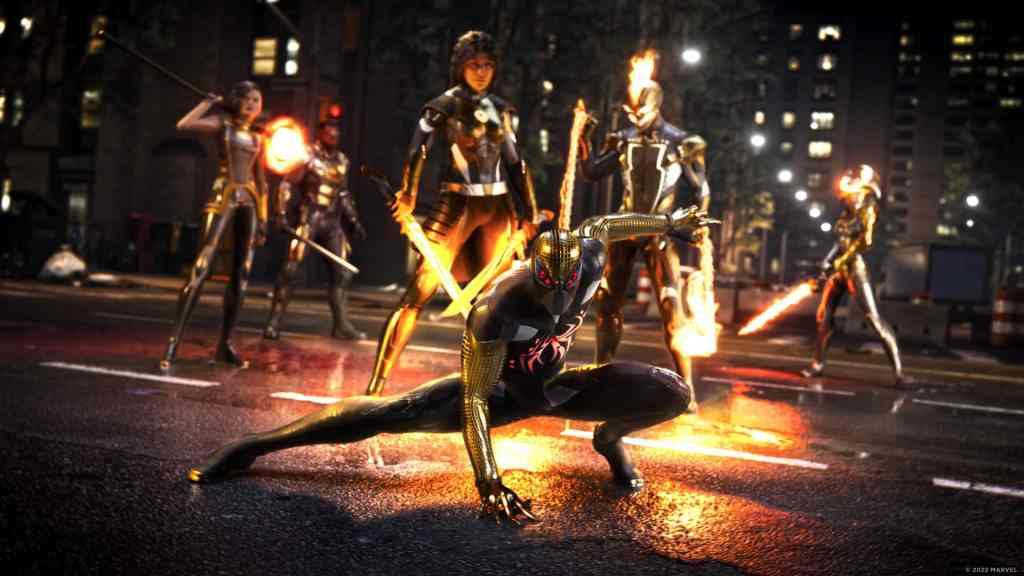
Solomon told GamesHub: ‘We started by saying that we’ll make something very much like XCOM, we’ll just put Marvel heroes in. And of course, that did not turn out to work out very well… the fantasy of being a soldier fighting a superior enemy, and being all tactical, taking cover… sometimes missing your shots and sometimes your allies die. None of those things made any sense.’
So with the blessing of Marvel – who gave Firaxis a level of freedom and trust that ‘floored’ DeAngelis – the team set out to build something new, and ended up aligning with the studio’s gradual but sure path of attempting to make each new strategy game they made more approachable and accessible for genre rookies.
Read: Marvel’s Midnight Suns preview – A romance in bloom
That involved some interesting design problems, like making the combat phases of the games challenging, while removing the idea that characters can die or miss their shots, like XCOM soldiers can. The solution involved giving these all-powerful heroes some interesting drawbacks when unleashing their powers, and creating an upward difficulty progression to encourage efficient and optimal play. The result provides the same white-knuckle level of decision-making that existing XCOM fans so desire. ‘We’ve got twice as many difficulty levels as we ever had for XCOM,’ said Solomon.
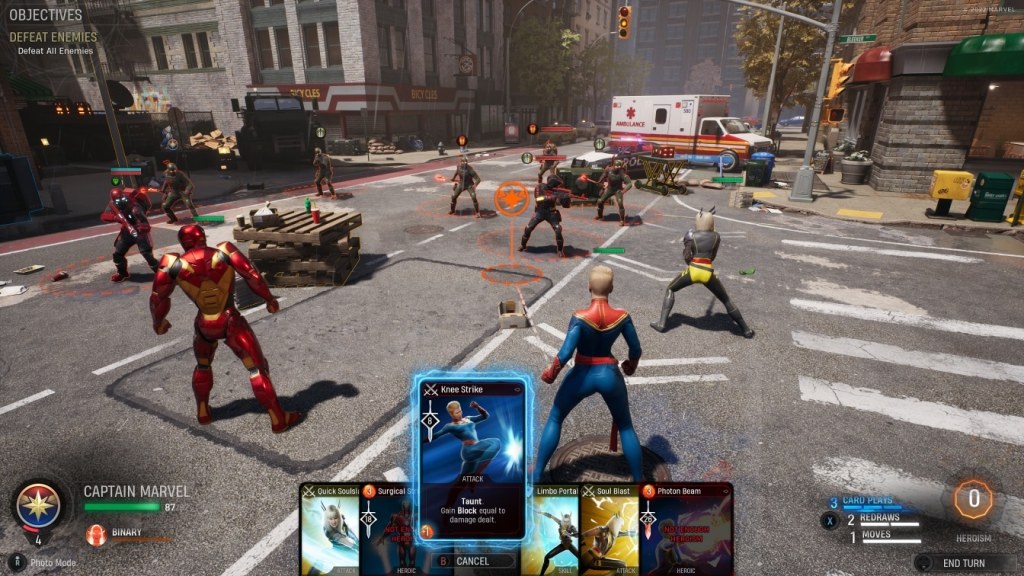
Another addition was a card-based ability system during the combat phase. DeAngelis says he didn’t think it was going to ship with the game, given the prestige they had to maintain as a Triple-A video game. Solomon describes the team as ‘grasping for straws’ when they stumbled upon it – but it ended up being an incredibly good solution.
DeAngelis remarked that, ‘Once you get over the hump of any baggage that comes with the cards, it is such a slick, quick system that ultimately fed the combat goal of: ‘We want this combat system to be approachable. We want you to be able to play fast. We want you to be able to make quick decisions, even though there’s a deep well of decisions you can make.’ And cards really satisfy that goal in a super, super elegant way.’
The inclusion of a strong narrative and characters was also a new challenge for Firaxis that ultimately serves as something that can help those not accustomed to strategy games feel more comfortable and invested. ‘It was a whole new deep end of the pool,’ said DeAngelis. ‘But it was something that we knew we had to do, and we knew we had to get it right.’
It’s exemplified in the relationships and bonds forged in the Abbey, the central hub of Midnight Suns where the player-created hero can interact and spend quality time with familiar characters, similar to other blockbuster third-person RPGs. DeAngelis remarked that the team wanted to echo the approach of games like Mass Effect.
‘This is just a great RPG. You have your own party, you’re recruiting them, you’re building them out. They have very distinct personalities. It’s just icing on the top when you’re a huge Marvel fan and you have that love for them in your life.’
There are plenty of fun details that litter the Abbey portion of Midnight Suns, too. Solomon called out a few of his favourite pet projects that lighten the mood of the game, like making sure you can decorate the Abbey with screenshots you take in the game’s Photo Mode, and the fact that the heroes are often in swimsuits. ‘I grew up reading the X-Men, and the X-Men were always hanging out by the pool,’ he said. ‘It made them seem cool. If I looked like Blade, I would be in a swimsuit 90% of the time.’
DeAngelis on other hand, has more of an affinity for the animal companions in the game, but also the presence of something touching with a connection to the real-world – the initials of Luke Wiltshire, a fan of the game who passed away from neuroblastoma. Luke’s last wish was to meet the team and play Midnight Suns, which he got, and it was a moment that made the Firaxis team realise how much joy their work brought to individuals.
Even though Marvel’s Midnight Suns is certainly not the direct next step for XCOM, and it makes a lot of changes to cater to a bigger potential audience, Solomon strongly believes the game is ‘pretty deep, pretty replayable and it is at least in line with what we’ve done as a team before.’
‘There’s a very good chance that anyone who likes the work we’ve done before will find a lot to like in Midnight Suns.’
The full interview with Jake Solomon and Garth DeAngelis follows, where they go into far more detail about the iterative development of Marvel’s Midnight Suns, the reasoning behind the big design decisions they made, the influence of Fire Emblem: Three Houses and Persona on the game’s relationship components, and a bit more on why Solomon was so adamant about the swimsuits.
Marvel’s Midnight Suns: Interview with Creative Director Jake Solomon and Executive Producer Garth DeAngelis.
(The following interview has been edited for clarity)
GamesHub: Jake, Garth, tell me about the origins of this project. What came first: the Marvel licence or a great game design idea?
Jake Solomon: Definitely the licence. Marvel approached us because they were fans of XCOM which is, of course, very flattering. And they asked if we wanted to partner with them to make a new game in the Marvel Universe, which we were very excited to do.
But we honestly thought – well, we started by saying that we’ll make something very much like XCOM, we’ll just put Marvel heroes in, and of course, that did not turn out to work out very well.
When you think about the fantasy of being a soldier fighting a superior enemy, and being all tactical, taking cover… sometimes missing your shots and sometimes your allies die. None of those things made any sense when you’re talking about Marvel superheroes. And then after that, Garth and I realised how much we were going to have to take a little time with this game.
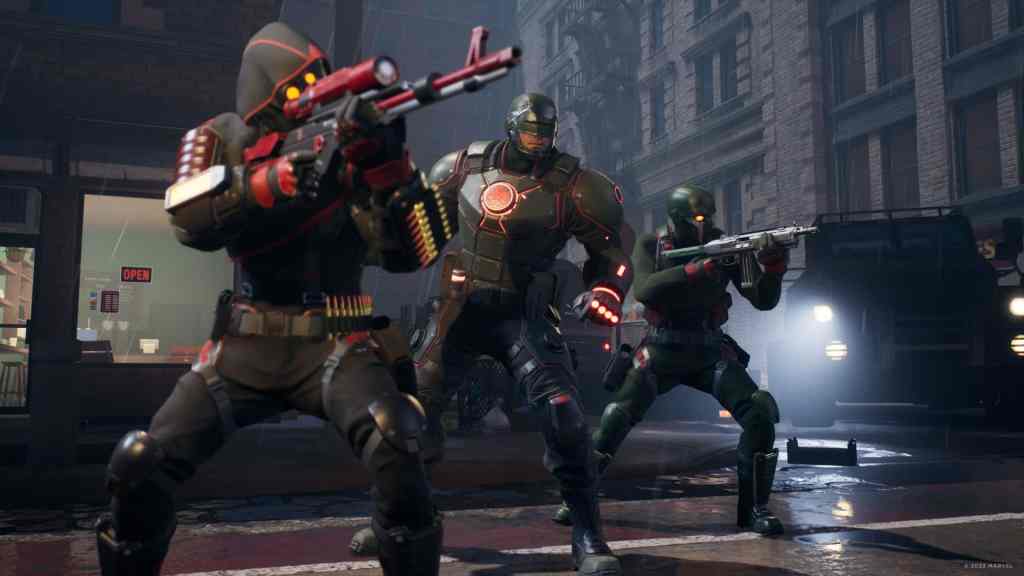
Garth DeAngelis: What’s interesting, too – and I never thought of it this way, because this question hasn’t been asked in the way that you asked it; licence or great idea – is that you can certainly be cynical if you’re like, ‘Oh, Jake and the team didn’t have the idea first, how did this turn into something that we hope is a success?’
But unlike the old days of licensed titles, Marvel was fantastic. Yes, the licence came first. But they didn’t approach us like, ‘Here’s the licence, and here’s what we need you to do.’
They approached it as, ‘We admire your past work, we admire what you did with XCOM. We think that this might be one of the premier strategy development teams to partner with in the world. Now, tell us what you’d like to do if you had the Marvel licence.’
And then that gave Jake and the team time to breathe, and really find where we ultimately went. What Jake has talked about a lot in the past is that we were naive for a few weeks, where we were like, ‘Yeah, we’ll just take superheroes and try putting them in cover! And I don’t know! Maybe some other ideas there!’
But Jake quickly found out that percent-to-hit [shooting probability mechanics] doesn’t feel good with a superhero. So it was neat. The licence came first, but Marvel Games encouraged us to fail fast and have the breathing room to find the best way to use the licence within our capabilities. And that’s what led to this, I think, pretty innovative idea.
I’m really hearing that a lot lately with Marvel-themed games. Some other studios I’ve talked to have also mentioned basically having free reign with the property, which is really nice to hear.
Garth DeAngelis: It just kind of floored me as well. I mean, you think about Marvel, and it’s a little intimidating. We have always had creative independence, and you wonder how iron-fisted they’re gonna be, but they truly haven’t.
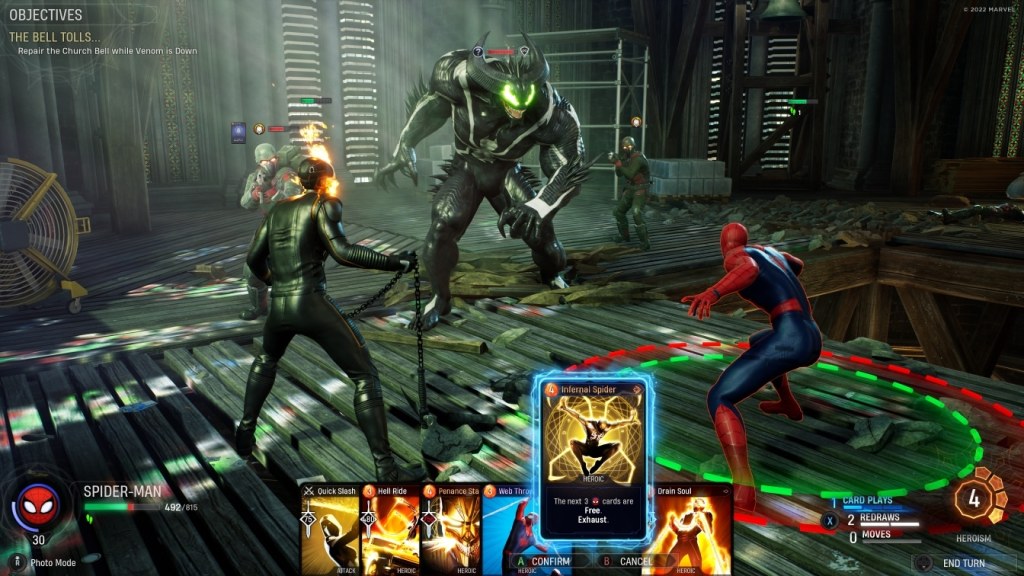
And we’ve heard that from other partners as well, too. Their mentality, I think, starting from the top of Marvel Games is, Let’s find these partners that we really believe based on their track record, based on what they’ve done in the past, and then we’ll trust them to do something very cool with the licence. You look at [Insomniac’s] Spider-Man and [Eidos Montreal’s] Guardians of the Galaxy and the Ultimate Alliance series [Team Ninja]. I think all that stuff has shaken out really, really well.
One of the first things I noticed was the interesting mix of street-level and cosmic-level Marvel characters in there. You talked a little bit about how the ‘soldier cover fantasy’ doesn’t work with superheroes, but there’s almost a purely street-level version of the game where it could. How did you find the right balance between having a range of characters, some that feel incredibly powerful, while making sure each phase felt challenging?
Jake Solomon: The interesting thing that you’ve pointed out there is the challenge of what I call ‘power scaling’, because that’s part of the fun fantasy of, not the movies so much, but the comics for sure. Like, one of the coolest things when you really get into the comics is that not every hero is created alike.
Like, Blade is awesome. Blade totally rules, but that’s not the same thing as Scarlet Witch, right? She’s a reality-altering, absolute powerhouse.
So in combining these characters, there’s the narrative challenge of finding – well really, it’s the narrative fun of saying, ‘Okay, let’s put these characters together whose worlds typically don’t cross.’
And then from a tactical perspective in combat, we had to find a way to say: ‘All right, well, we do have some really powerful characters like Captain Marvel, like Scarlet Witch, like Ghost Rider,’
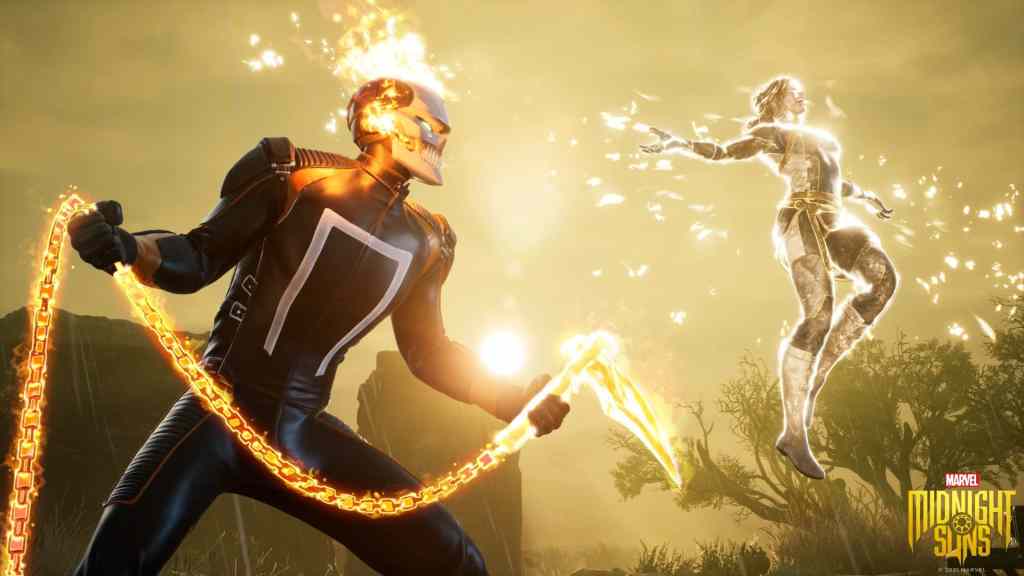
And we have to use the mechanics to say: ‘All right, well then we have to give these characters some interesting drawbacks to where they can definitely reach power levels higher than the other heroes, but, you have to build to it.’ Or, they’re inflicting a cost on themselves when they use these abilities.
So yeah, it was definitely an interesting thing to think about, integrating characters from all across the universe and trying to make them feel true to what you kind of expect.
I was also surprised to see a card-based system during the combat phase. Why cards?
Garth DeAngelis: Well Jake wisely found out early, even in our paper prototyping phase, that you can’t use the randomness directly from XCOM, talking about percent-to-hit, and also taking cover.
And he’s talked a lot about the power fantasy and reversing that. You are now the superior foe as the superhero, and you’re punching Hydra grunts. So your attacks always have to succeed. And in any great tactics game, you need pieces that make it feel like a puzzle, and make it feel like you don’t quite know how you’re going to solve the problem. There’s the tools there, but you don’t quite know how you’re going to do it.
I’ll be completely clear – Jake, I know you don’t mind – I’m not nearly as smart as the designers, of course, but I didn’t think cards were going to ship with the game. But they are such an elegant solution to how to have this system work. And there is –
Jake Solomon: You’re giving us a lot of credit, it’s not like I knew what I was doing either at the time. We were all grasping for straws!
Garth DeAngelis: It worked! And at first you’re like, ‘We can’t have cards, we’re going to be a big Triple-A strategy game!’ But it’s super elegant. I think there’s enough of an understanding there for things like, you want to re-draw for variability, and you want to deal out a new hand of abilities, right? And anyone can understand that.

So once you get over the hump of any baggage that comes the cards, it is such a slick, quick system that ultimately fed the combat goal of: ‘We want this combat system to be approachable. We want you to be able to play fast. We want you to be able to make quick decisions, even though there’s a deep well of decisions you can make.’ And cards really satisfy that goal in a super, super elegant way.
And then of course, you look at other games in the recent years that have also shown that [cards] fit well. And the games are super elegant, whether it’s Slay the Spire or Monster Train, or even Neon White – you never think you can hodgepodge cards into a genre like that.
It’s such a ripe system for designers to use. It made sense for us, and then of course, we’re the first – we’re the first card game in the Marvel Universe right? (Laughs) Well, you look at games like Marvel Snap, which is great. I think it’s a great system.
Another thing I was quite surprised to read about in the recent previews of the game was the relationship-building in the Abbey portion of the game. My mind immediately went to the fever of Fire Emblem: Three Houses of 2019. Tell me about introducing that – is it your way of building those sorts of XCOM-style soldier bonds and better player investment in these characters? Or is it something more than that?
Jake Solomon: It definitely started there, and we knew that we were going to push it further.
It was really funny when Fire Emblem: Three Houses came out, and I had no idea that was coming. I mean, we’ve always had relationships in Fire Emblem, but that one was so in-depth, and there was a sense of like, ‘Oh man!’
And what did they call the place… we called ours the Abbey…
The Monastery.
Jake Solomon: Monastery! Right. So they did it first, and they did it amazingly, but you can imagine how annoyed we were! I was like ‘Wait, it’s called the what!? Come ON.’

But you know, it was a fantastic game. We played a lot of Persona just to put our heads in the space of: ‘How do you put interesting game design behind relationships?’
We had a version of that in XCOM with the soldier bonds. But with the Marvel heroes and more defined characters, I think we immediately saw the opportunity to make relationships more valuable, especially because the player has an avatar.
So that was always a part of it, the ability for the player to put themselves into the game and into the story. And so that’s when we knew that we really wanted to make relationships, and building relationships with the heroes, an important part of the game.
There’s a lot more focus on the narrative element of Midnight Suns than there has been in past Firaxis games. What was that like, having to dive deeper into that area of game development?
Garth DeAngelis: It was a whole new deep end of the pool. But it was something we knew we had to do, and we knew we had to get right. We knew we had to level up as a team.
When you’re talking about this IP … we felt like we had a responsibility with this licence to not only satisfy what we’ve done well, and what the Marvel Games team admired in the past in the systems design of things like XCOM – but what the fans love about this IP is the narrative and the world building,
Marvel Games was a great partner for that. They really leaned on us for what we wanted to do from a design standpoint, and we would have great collaborative sessions with them about things like, ‘Hey, we want to tell this supernatural story, help us unlock some ideas for the best way to do that.’
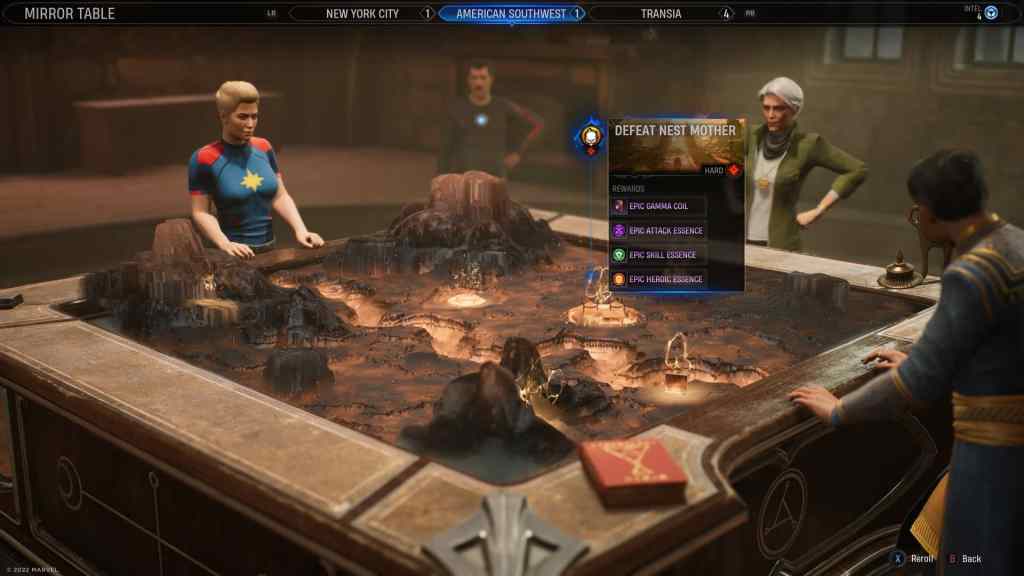
But yeah, it was brand new, it was brand new. And from a production standpoint, we had to develop all new sorts of pipelines, we had to develop a new mentality, creatively, amongst the team as well, too. Jake and I always used to think about design first, gameplay systems first. With XCOM, the best story is always what’s in the player’s head.
But now with this one? No, there is some really great ripe material that is not what’s in the player’s head. This is how Tony Stark is. This is how Steve Rogers is. We still want to give you systems where you can create your own relationship with them, maybe in a way that’s unlike your friend who’s playing. But there are some preconceived personalities there that we want to make sure come out in this really deep, deep story.
These days, there are a lot of people who love Marvel comics, films, and shows. But there’s also clearly a big section of the audience there that just doesn’t like that stuff at all. Has been a lot of thought about bringing in people who maybe just want a good high-end AAA tactical strategy game, and don’t care about Marvel heroes? Is there enough in Midnight Suns for them, do you think?
Jake Solomon: I think so. From the tactical side, it’s a game that I think is pretty deep, pretty replayable and it is at least in line with what we’ve done as a team before. There’s a very good chance that anyone who likes the work we’ve done before will find a lot to like in Midnight Suns.
And then I think that the fun part, even if you’re not into Marvel, the main character of the game is not a known Marvel character, it’s you. You get to create a new hero, you get to choose how they talk, you get to choose how they behave in combat. And so I think that there’s a lot of freedom there where you’re not reliving another Marvel story, you’re writing a new Marvel story.
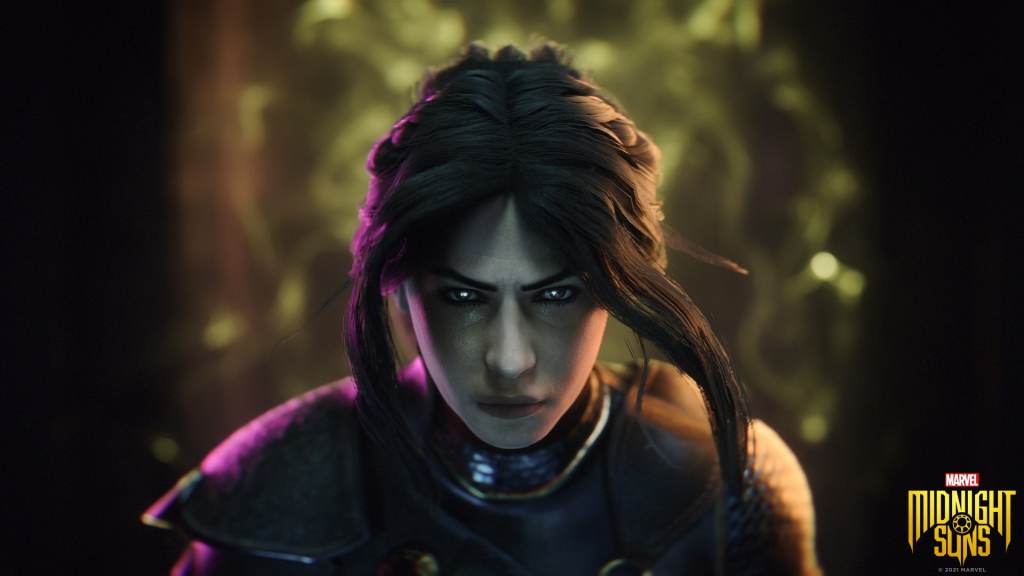
Garth DeAngelis: I think the game is very CRPG-esque, very Bioware, Bethesda-esque when you create your own hero in an RPG. You can almost look at it, if you want to, as a blank slate, and then go do your thing.
And then there’s these really colourful personalities that become your RPG party members. You may very well not know who someone like Nico is. But even if you’ve been living under a rock and you don’t know who Tony Stark is, he’s a pretty cool dude with a really cool personality that has some great capabilities.
And to me, it’s like, this is just a great RPG. You have your own party, you’re recruiting them, you’re building them out. They have very distinct personalities. It’s just icing on the top when you’re a huge Marvel fan and you have that love for them in your life.
It’s one of the things I’m most excited about just because I love those RPGs so much, even when they’re not licensed, right? They’re just like, whoever, right? It’s Morrigan from Dragon Age, right? She was just fun to talk to. And we have all of that with our party members.
As a longtime Firaxis follower, and looking at the studio’s releases over the last decade or so, it seems like the company’s on a bit of a quest to sort of make strategy and tactics more accessible, and more approachable to a broader audience. This is kind of a next step in that. Aside from some of the stuff we’ve already talked about, what are some of the other big steps that you are taking to make the game element easier to get into, for someone who might have not played a strategy game before?
Jake Solomon: I think there were a couple of things. I mean, when you play Midnight Sons, it’s not like XCOM where, maybe from the beginning, you feel like the objective is not to die, right? Midnight Suns doesn’t operate like that.
Garth DeAngelis: Maybe? We worked closely on the tutorial. I mean, you can just look at the fact that XCOM 2‘s tutorials are like: ‘Hey, your buddy right there? He gets killed right away.’ That doesn’t happen.
Jake Solomon: Yeah what I loved about the XCOM tutorials is like two people would die. They had to die. Right? And we’d be like, your rating at the end of the mission is ‘Excellent.’ (Laughs)
And so we tried to establish real early like, ‘It’s okay, it’s okay. You’re gonna lose some people,’ But yeah, Midnight Suns. At the starting difficulty, the game is not about, ‘am I even going to survive this thing?’ It’s about, ‘how well can I beat this mission?’
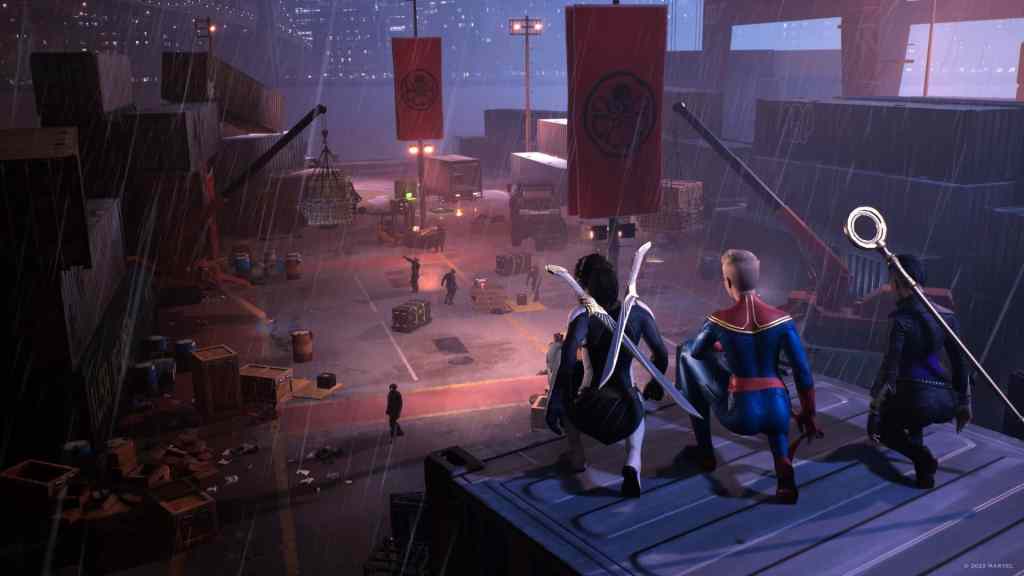
But then, by playing missions well, which you will do, we unlock higher difficulties, which allows players to float UP to the difficulty, where they go ‘Oh, THIS is the right one for me.’
You can get all the way over to the XCOM type of difficulty and further, in the sense of like, ‘Oh, I have to take five minutes to think about this turn,’ If you want to rise to that level of difficulty, we’ve got twice as many difficulty levels as we ever had for XCOM just that purpose.
And part of the approachability is in the Abbey as well. Now, instead of the XCOM base, which would be a series of menus, which was perfect for XCOM, in Midnight Suns, the Abbey is basically walking around in real-time. Even things like camera angles make games more accessible I think, where players can go ‘Oh okay, I’m used to this. This looks like virtually every other third-person game I’ve played.
Garth DeAngelis: I think it’s about removing abstraction wherever the team could. Going back to the combat layer – Jake, I was also going to mention the camera, that was a HUGE decision by the team.
It’s so hard for us too, because as you know, tactics diehards were like ‘Isometric camera! Isometric camera!’
But putting it down right over the hero’s shoulders, you almost feel like you’re looking at Insomniac’s Spider-Man, just looking at it, right? Because it’s so close. And then you still could play the game that way.
And all of the micro-decisions that the team made enabled that to happen. There’s no grid on this combat system, which again, as a tactics lifelong diehard – at first I’m like, ‘Oh my god, do we know what we’re doing? What do you mean no grid? I need to know where my characters are moving!’
But it makes the whole system more approachable and more accessible in that you don’t have to min-max every single move. Movement is still important, but it’s just relegated now to ‘Hey, figure out how you want to optimise once per turn.’ Other than that, you got Iron Man, click on the enemy, go ahead and blast them. And then the game carries it out for you very, very seamlessly.
So little things like that. I think the designers did a great job of really getting their hands dirty, and piecing apart some conventions of the tactical genre, and really rethinking them and innovating in a new way that I haven’t seen before.
Yeah, it’s really interesting to see people getting away from the grid. The new Mario + Rabbids game had no grid? It’s like a whole new world. My last question for both of you is what is one small detail about Midnight Suns that you personally really love, but you think might go unnoticed by players?
Jake Solomon: Well, maybe not unnoticed… I have a couple. I’m all about the details. I admittedly am a very, very detail-driven designer. People sometimes know I have pet project things. So luckily, Garth is the executive producer, he allows me to have a few of these where he can just tell this one’s gonna have to go in.
So one would be the pool. So, the grotto and the swimsuits, like the heroes having their swimsuits. (Laughs)
There really is no need for that. Or multiple swimsuits, or multiple cuts of swimsuit. But I grew up reading the X-Men and the X-Men were always hanging out by the pool, and it made them cool, and it made them just seem like… Look. If I looked like Blade, I would be in a swimsuit 90% of the time. I’d be like, ‘Oh, I’m sorry, did my battlesuit just fall off? I’m in my swimsuit again? I guess I am.’
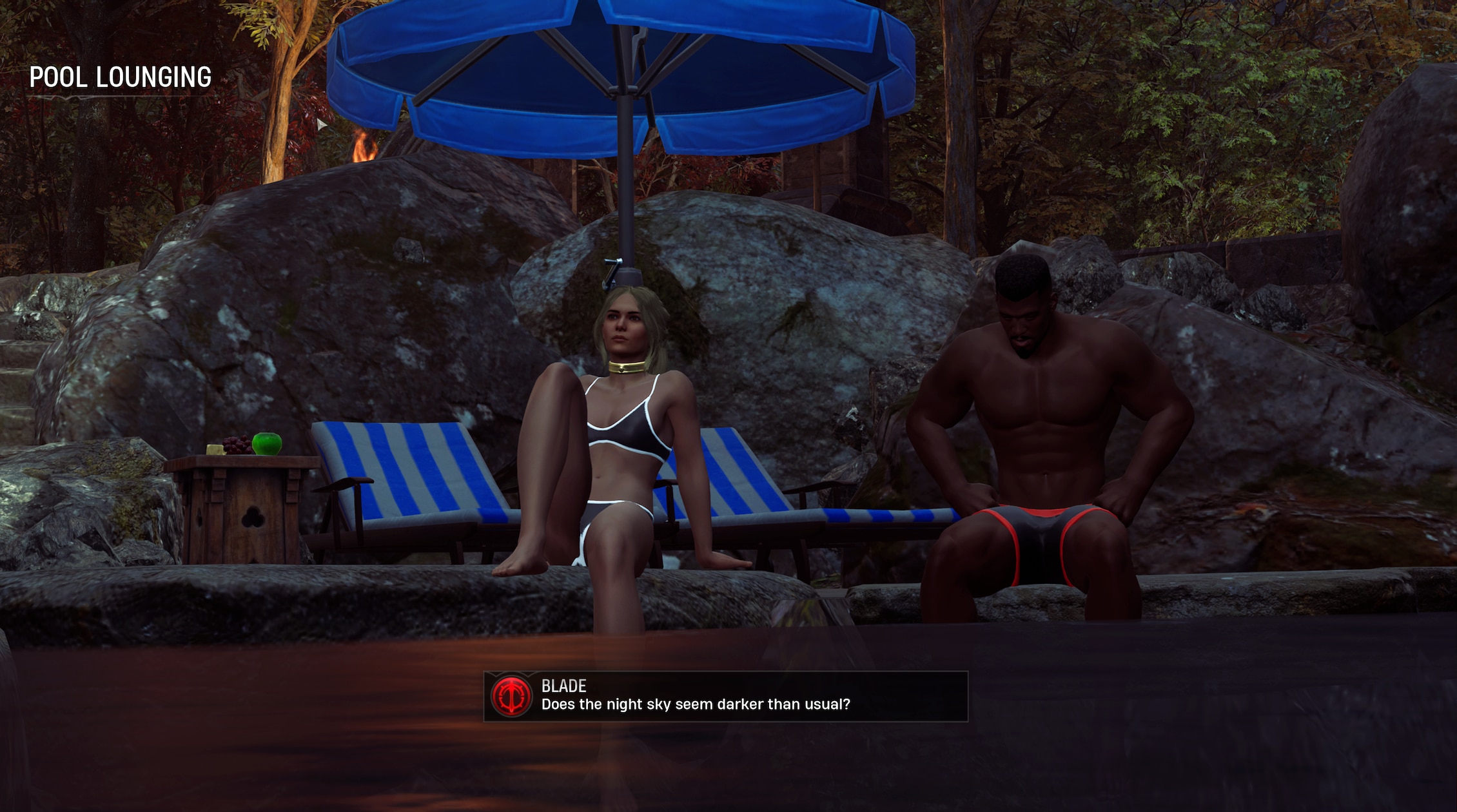
Like, they would be in swimsuits all the time. So I love that we were able to lighten up the Abbey and have those moments of ‘Yeah sure, you’re fighting, and the characters take the story seriously. But still, they have things like a pool that they can lounge around in, because a lot of them are young.
The other feature is being able to put pictures you’ve taken in photo mode, and putting them into frames around the Abbey. It was also another thing that I was really big on, because I just love the ability to like make your own art and hang it on the walls. And I know that a lot of times, people are going to use it in a silly way. Sometimes they’ll do it in a really cool way, and I just love allowing people to be creative in that way. It always just gives me, you know, a lot of joy. So those are probably the two that I’d say are not big features. But they’re important to me, AREN’T THEY GARTH?
Garth DeAngelis: Yeeeeeeeah, and you have a knack for those things that are maybe easy to dismiss in the thick of trying to put a thousand other things together, but they really do add some of the magic to the game.
I have two as well, one of them is another ‘Jake Special,’ I’ll call it. So you have Charlie (the dog) in the game, She’s pretty obvious. It’s awesome having her as a pet. But then there’s another pet that we talked about as well too, Ebony the cat. And she is pretty easy to go unnoticed. I was actually playing the other night with my son who is obsessed with exploring the grounds. And all of a sudden he heard like a meow and he’s like, ‘What was that? Where is that?’ And he was looking all over for it.
The second one’s a little more… We haven’t really had the opportunity to talk about this, but I’m really really proud of it. There was a fan of the game, his name was Luke Wiltshire. He had neuroblastoma, which is a rare disease that he unfortunately passed away from. But his last wish was to meet the Marvel Games team and to meet our team, because he wanted to play Midnight Suns. And 2K made it happen, they flew a representative out there, and he was able to play the game.
We designated him as a special designer, we got to talk with him for a few hours in his house, and he would play through the game and we’d watch him. And our lead concept artist, Aaron Yamada-Hanff actually inscribed his initials on a tree in Dreamer’s Descent, which is one of the areas you can explore in the game.
And we haven’t talked about this with anyone yet, but I’m really proud of that, because those moments… you sort of realise, you’re in this pretty hard development cycle for a while and you realise how much ultimate joy this brings to individuals that are really in need, and are looking for a light in their life. And out of everything he could do this, this guy wanted to play Midnight Suns. So it’s pretty cool that he was very, very happy that we could memorialise him in the game. We let him know we were going to do that, and I think it really, really made his week.
Marvel’s Midnight Suns launches on PlayStation 5, Xbox Series X/S and PC on 2 December 2022.
GamesHub has affiliate partnerships. These do not influence editorial content. GamesHub may earn a small percentage of commission for products purchased via affiliate links.
